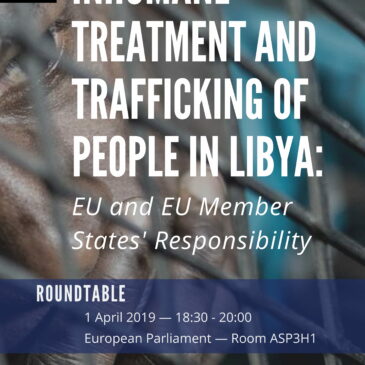News Highlights: Press conference: Eritrea Foundation summons EU, EU pushback to Libya, operation Sophia ships suspended
In this week’s news highlights: Foundation prepares legal action against EU over use of forced labour in Eritrea; European Parliament hosts Roundtable on Libya; Pro-Asyl denounces EU push back of migrants and refugees; EU suspends ship operations of operation Sophia; French Constitutional Council authorises bone tests to determine migrants age; 200 refugees forced to leave their accommodation in Greece; WRC reports on the sexual violence practicises against refugees in Libya; 30 migrants lost in the Mediterranean; Amnesty International denounces the human rights situation in Libya at UNHRC; Closure of detention centre Al Hamdi in Tunisia; Eritreans continue to flee their country, says Ethiopia; and the Commission on Human Rights in South Sudan reports a ‘endemic’ sexual violences situation in the country.
News Highlights: Deaths in Libyan detention centres, “peace did not change Eritrea”, NGOs criticise returns to Libya
In this week’s news highlights: conditions deteriorate in the Zintan detention centre in Libya; MSF reports the degrading conditions for refugees in Tripoli centre; Refugees in Tunisian UNHCR shelter driven to suicide attempts; Political and economical instabilly and protest continue in Sudan; UN Human Rights Council discusses lack of progress on human rights in Eritrea; EU’s continued engagement in Eritrea criticised; Ethnic violence and humanitarian crisis threaten to escalate in Southern Ethiopia; Head of mission Libya of MSF criticises Europe’s and France’s migration policy; NGO Alarmphone alarmed by European policy to deter refugees and migrants; and asylum applications in the EU in 2018 decline to pre-2014 levels.
UN Human Rights Council calls for improving the human rights situation in Eritrea
On 11 March 2019, Human Rights Council held an enhanced interactive dialogue on the situation of human rights in Eritrea following the Council’s resolution 38/15. The dialogue was organized with the participation of Daniela Kravetz, the Special Rapporteur on the situation of human rights in Eritrea, Kate Gilmore, United Nations Deputy High Commissioner for Human Rights, civil society and other stakeholders.



